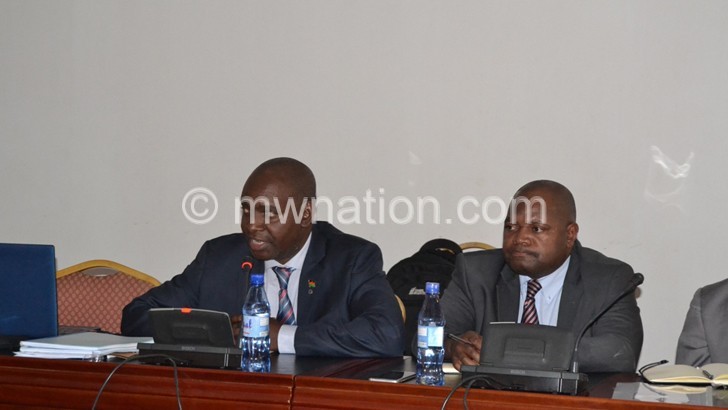LWB explains lack of water project ESIA
The Lilongwe Water Board (LWB) yesterday told the Budget and Finance Committee of Parliament that the Attorney General (AG) stopped the water utility from proceeding with the environmental and social impact assessment (ESIA) in the Salima-Lilongwe Water Project.
Briefing the committee at Parliament Building in Lilongwe, LWB chief executive officer (CEO) Alfonso Chikuni said the parastatal was about to invite expressions of interest from independent consultants to undertake the ESIA when the AG stopped them.
He said: “We were about to advertise for the independent ESIA. That is the time when we received a letter from the Attorney General [advising LWB not to go ahead with the process]. The letter from the AG is available for your [committee] scrutiny.”

But Chikuni clarified that the implementation structure of the project is taking care of the ESIA needs and requirements. He said the board will use the engineering, procurement and construction (EPC) method.
EPC is a particular form of contracting arrangement where the contractor is made responsible for all activities from design, procurement and construction to commissioning and handover to the client.
The method also entails that the contractor owns the project risk for schedule and budget in return for a fixed price. The main risk for the client, in this case LWB, is the definition of the specification upon which the contract is based.
Said Chikuni: “This is where we are not being understood because we are used to traditional [methods of] procurement. Traditional procurement, in our opinion, would not have met the objective to deliver the project by 2018.
“So, legally, we have always said that there wasn’t anything wrong that LWB did [in the process of identifying the contractor]. And based on the facts and the determined time of completion, this is the only way we would have gone.”
On controversies surrounding the identification of the contractor of the project, Chikuni stated that the board used methods that are “in our law available to us” namely, single sourcing, restricted tender and open tender.
“Based on our experience, we recommended to government that we would go for restricted tendering for those contractors that have the capacity. But again, the Office of the Director of Public Procurement, if they had their own list, they would say please include a few others or don’t include others that were risky,” he said.
He said thereafter, the board presented the case to the Ministry of Finance through the Ministry of Agriculture, Irrigation and Water Development, which informed them that Cabinet had approved it.
Said Chikuni: “I do not want to speak on behalf of the Cabinet. But we were told that these processes had been dealt with and duly complied with.”
He said there was no intent on the part of the board to bypass Parliament.
Zomba-Chisi legislator Mark Botoman (Democratic Progressive Party-DPP) said it was obvious from the LWB presentation that the project remained the most practical way towards addressing water problems.
But the member of Parliament (MP) wondered whether LWB was employing relevant public relations (PR) strategy to clear the misconceptions and controversies surrounding the whole project.
Said Botoman: “What has been the PR strategy on your side in as far as this project is concerned? I am asking this question because from your presentation and explanation, it is very clear that there has been no [fraudulent acts] in it.”
Committee chairperson Rhino Chiphiko said they were satisfied with the explanation from the board and fully supported the project. He said it was unfortunate the AG was putting “spanners in the works”.
He said: “On behalf of the committee, I wish to assure you of our support. I will be interacting with the Secretary to the Treasury and Ministry of Finance and I will continuously ask for their support of the project.”
Last evening, AG Kalekale Kaphale refused to comment on the matter, but said he was ready to appear before the committee should MPs need his explanation on the legal opinion he gave the board.
The Salima-Lilongwe Water Project, to pump water from Lake Malawi over a distance of about 130 kilometres, has drawn mixed reactions from stakeholders with some questioning the manner the contract was awarded and the lack of ESIA and yet others backing the project in its present form.
Malawi Law Society asked the Department of Environmental Affairs to provide the ESIA report or stop the project in the absence of the document.
The Law Society position followed an earlier concern raised by Kenneth Wiyo, an associate professor at Bunda College of the Lilongwe University of Agriculture and Natural Resources (Luanar), who faulted the absence of a hydrographic study and ESIA.
Government guaranteed a $500 million loan to LWB to tap water from Lake Malawi. n





